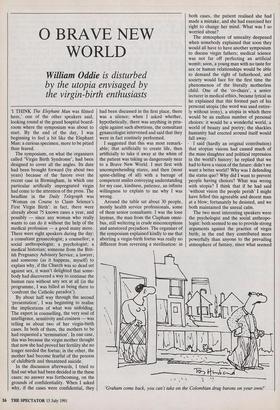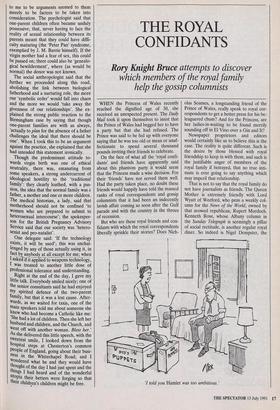O BRAVE NEW WORLD
William Oddie is disturbed
by the utopia envisaged by the virgin-birth enthusiasts
`I THINK The Elephant Man was filmed here,' one of the other speakers said, looking round at the grand hospital board- room where the symposium was about to start. By the end of the day, I was beginning to feel a bit like the Elephant Man: a curious specimen, more to be pitied than feared.
The symposium, on what the organisers called 'Virgin Birth Syndrome', had been designed to cover all the angles. Its date had been brought forward (by about two years) because of the furore over the recent case in Birmingham, in which one particular artifically impregnated virgin had come to the attention of the press. The headline in the Daily Telegraph was `Woman on Course to Claim Science's First Virgin Birth': in fact, there were already about 75 known cases a year, and possibly — since any woman who really wants to can do it without the help of the medical profession — a good many more. There were eight speakers during the day: a consultant gynaecologist; a counsellor; a social anthropologist; a psychologist; a medical historian; someone from the Brit- ish Pregnancy Advisory Service; a lawyer; and someone (as it happens, myself) to explain why, if the Church was so dead set against sex, it wasn't delighted that some- body had discovered a way to continue the human race without any sex at all (in the programme, I was billed as being there to `confront the Catholic paradox').
By about half way through the second `presentation', I was beginning to realise the implications of what was unfolding. The expert in counselling, the very soul of intelligence, sensitivity and cosiness — was telling us about two of her virgin-birth cases. In both of them, the mothers to be had requested a 'termination'. In one case, this was because the virgin mother thought that now she had proved her fertility she no longer needed the foetus; in the other, the mother had become fearful of the process of childbirth and threatened suicide.
In the discussion afterwards, I tried to find out what had been decided in the these cases: no answer was forthcoming, on the grounds of confidentiality. When I asked why, if the cases were confidential, they had been discussed in the first place, there was a silence; when I asked whether, hypothetically, there was anything in prin- ciple against such abortions, the consultant gynaecologist intervened and said that they were in fact routinely performed.
I suggested that this was most remark- able; that artificially to create life, then artificially to take it away at the whim of the patient was taking us dangerously near to a Brave New World. I met first with uncomprehending stares, and then (most spine-chilling of all) with a barrage of competent smiles conveying understanding for my case, kindness, patience, an infinite willingness to explain to me why I was wrong.
Around the table sat about 30 people, mostly health service professionals, some of them senior consultants. I was the lone layman, the man from the Clapham omni- bus, still weltering in crude misconceptions and untutored prejudices. The organiser of the symposium explained kindly to me that aborting a virgin-birth foetus was really no different from reversing a sterilisation: in both cases, the patient realised she had made a mistake, and she had exercised her right to change her mind. What was I so worried about?
The atmosphere of unreality deepened when somebody explained that soon they would all have to have another symposium to discuss virgin fathers; medical science was not far off perfecting an artificial womb; soon, a young man with no taste for sex or human relationships would be able to demand the right of fatherhood, and society would face for the first time the phenomenon of the literally motherless child. One of the 'co-chairs', a senior lecturer in medical ethics, became lyrical as he explained that this formed part of his personal utopia (the word was used entire- ly without irony), a utopia in which there would be an endless number of personal choices: it would be a wonderful world, a world of beauty and poetry; the shackles humanity had erected around itself would fall away.
I said (hardly an original contribution) that utopian visions had caused much of the mass slaughter and political repression in the world's history; he replied that we had to have a vision of the future: didn't we want a better world? Why was I defending the status quo? Why did I want to prevent people having choices? What was wrong with utopia? I think that if he had said `without vision the people perish' I might have felled this agreeable and decent man at a blow; fortunately he desisted, and we both maintained the unreal calm.
The two most interesting speakers were the psychologist and the social anthropo- logist: both seemed to me to provide strong arguments against the practice of virgin birth; in the end they contributed more powerfully than anyone to the prevailing atmosphere of fantasy, since what seemed `Graham come back, you can't take on the Colombian drug barons on your own!'
to me to be arguments seemed to them merely to be factors to be taken into consideration. The psychologist said that one-parent children often became unduly possessive; that, never having to face the reality of sexual relationship between its parents meant that they could have diffi- culty maturing (the 'Peter Pan' syndrome, exemplied by J. M. Barrie himself). If the virgin mother had a fear of sex, this could be passed on; there could also be 'genealo- gical bewilderment', where (as would be normal) the donor was not known.
The social anthropologist said that the further we proceeded along this road, abolishing the link between biological fatherhood and a nurturing role, the more our 'symbolic order' would fall into chaos and the more we would 'take away the givenness of our relationships'. She ex- plained the strong public reaction to the Birmingham case by saying that though one-parent families are with us always, `actually to plan for the absence of a father challenges the ideal that there should be one'. When I took this to be an argument against the practice, she explained that she had intended this statement ironically.
Though the predominant attitude to- wards virgin birth was one of ethical neutrality, there was, emanating from some speakers, a strong undercurrent of ideological hostility to the 'traditional family': they clearly loathed, with a pas- sion, the idea that the normal family was a father, a mother and one or more children.
The medical historian, a lady, said that motherhood should not be confined 'to women who are prepared to submit to heterosexual intercourse'; the spokesper- son for the British Pregnancy Advisory Service said that our society was tetero- sexist and pro-natalist'. One delegate said: 'If the technology exists, it will be used'; this was unchal- lenged by any of those actually using it, in fact by anybody at all except for me; when I asked if it applied to weapons technology, I was treated to another little dose of professional tolerance and understanding. Right at the end of the day, I gave my little talk. Everybody smiled nicely; one of the senior consultants said he had enjoyed my spirited defence of the two-parent family, but that it was a lost cause. After- wards, as we waited for taxis, one of the main speakers told me about someone she knew who had become a Catholic like me: She had a lot of children. Then she left her
husband and children, and the Church, and went off with another woman. Bless her.' As she delivered this little speech, with the
sweetest smile, I looked down from the hospital steps at Chesterton's common People of England, going about their busi- ness in the Whitechapel Road; and I wondered what he and they would have thought of the day I had just spent and the
things I had heard and of the wonderful utopia their betters were forging so that their children's children might be free.



















































 Previous page
Previous page